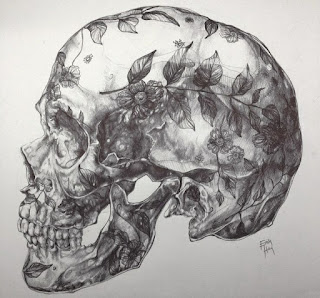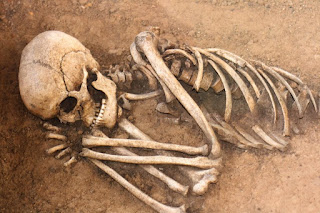Death In Advance: Working With the Live Bits
From the womb, the baby opened her eyes, and saw through
stretched skin patches of light… So contrary to the darkness when she closed her
eyes. And when she worked her way through the birth canal, she was squeezed so
hard that when she was free from constriction, the freedom of movement shocked
her. Indeed, she knew nothing other than perfect temperature, until the earth’s
atmosphere weighed on and prickled her skin which made her startle and cry. Her
own voice never before heard, was a foreign experience after having never used
her vocal chords.
After the labor, when the mother sighed a breath of relief
and held this precious and perfect brand new baby in her arms, did she realize
that she had given birth to not only a live human child, but also a human
death? When she was growing this eager and vibrant fetus in her womb, did she realize that in that very creation, the
exact thing that was becoming life,
could not exist without also having a death? The moment life is created, death
is also created. For one cannot exist without the other.
This might be a trippy existential contemplation but it’s
also just plain fact. If only we had embraced this fact daily, cheerful to awaken to another day instead of slowly turning toward utter denial of not only our own mortality but our fragility as
a species, we may have evolved culturally quite differently. Right now, humans in North America (specifically talking about us right now, not the rest of the world) are an embarrassing mess. But it’s
cool, because I look amazing in the latest Snapchat filter. Funny, do you know the story of
Cephissus? When we can have eternal
youth and beauty and distraction inside a pocket sized mirror device, why should we worry about awakening from this death denying culture? Well, because the very thing that gives us beauty will also
take it away. Denying or only side-glancing at this detail is causing us to be less empathetic, less appreciative and less curious of life and living in general.
I am dying. Just like you.
The only difference is which stage each of us is at. I am 40 years old, you
might be 20, 90 or 5. But with every moment we are alive we are one moment
closer to our death. For me, I take comfort in this. Do I want to die? Oh, hell
no. But my death is what is enabling me to live. So, I choose to embrace my
death. I choose to respect and be kind to my death to walk beside and love my own death.
I was overjoyed when I recently read in Sakyong Mipham Rinpoche's new book, The Lost Art of Good Conversation: Contemplate you are on your death bed about to take your last breath. What do you need to say and to whom?
I was overjoyed when I recently read in Sakyong Mipham Rinpoche's new book, The Lost Art of Good Conversation: Contemplate you are on your death bed about to take your last breath. What do you need to say and to whom?
Ooooh, do this. Do this exercise fully and often. When you have spent time with the dying you come to realize how enormously important this exercise is and how much more fully and lovingly you will live your own life. And, if you are able and if it is appropriate, you can use this contemplation for not only healing but for inspiration and motivation for your life as well.
Sit in a nice comfy meditation posture or lay down in a place where you won’t be disturbed for a bit. Settle in, take deep breaths, roll out your shoulders, wiggle your bottom and then don’t move. Get dead. Get really good and dead. But not to the point where there are maggots partying in your guts or you’re about to be pushed into the fire chamber of the crematorium. Freshly dead. Gently dead. No organ function. No pain. No fear. No work. No stress. Only total clarity and genuine peace.
Sit in a nice comfy meditation posture or lay down in a place where you won’t be disturbed for a bit. Settle in, take deep breaths, roll out your shoulders, wiggle your bottom and then don’t move. Get dead. Get really good and dead. But not to the point where there are maggots partying in your guts or you’re about to be pushed into the fire chamber of the crematorium. Freshly dead. Gently dead. No organ function. No pain. No fear. No work. No stress. Only total clarity and genuine peace.
Stay right there.
Look at your life from the point where you died. This will
only work if you imagine that you just died the moment you sat down to
contemplate this. You are not imagining yourself dead in the future.
Make four lists:
1) Who or what do you need to make amends with? Who do you need to tell
that you love them? Who do you need to tell that they hurt you? Who do you need to
get clarification from because you really feel screwed over? Or, are you able to let that go now that you have perspective from your deathbed? Remember, you’re
dead so being pissed that your spouse didn’t help at all to clean up or prepare
the meal for all of your in-laws does not count. Details of daily life hurt but
they don’t show up when you’re dying; no one cares anymore about the dishes. In
fact, these pains and annoyances become completely irrelevant. If your spouse
abused you, or if you abused your spouse or if they left you for your best
friend, this counts. These are the broad strokes that you are seeking.
2) What are you thankful for accomplishing in your life?
Were you
able to forgive someone who deeply hurt you? Did you parent your children as
best you could at that time with the amount of knowledge and resources
available? Did you produce beautiful gardens or food, or help animals? Did you
do your best to speak for those who were unseen or unheard? Did you gently take
care of yourself? These are the things your friends and family will remind you
of on your deathbed. If you are dying alone, you will be glad that you thought
of these accomplishments in advance because often they are hiding in our
everyday life.
3) What do you need to forgive yourself for?
What is your biggest emotional pain? That’s probably the one you need to forgive yourself for. Sometimes you need to forgive yourself for not being gentle enough on yourself. There might be several things you feel you need to forgive yourself for… Or hundreds. It’s ok. List one at a time. Be gentle... So very gentle.
4)
What were you capable of doing that you
did not do?
Would
you have been able to be more patient and kind with others had you looked at
things differently? Were you capable helping more people? Were you capable of
speaking up when everyone else was quiet?
Were you capable of letting go of grudges and regrets while you were
alive? Were you capable of being more kind to yourself if you had been able to
see things from a different view point? All of this will arise and confront you
on your deathbed.
If you are not crying already, now is a good time to let it
rip. The gift of life that your mother gave to you has come to an end and you
are dead. Look back at your magical
life. Life is utterly and
unexplainably magic. How the heck did you even get into that body? And
from where? From this view you now
can be positive that you did absolutely everything you could to survive in the
best way you knew on planet earth. You were not given instructions on “how to
live” and even if you were, the clarity and preciousness of hindsight is masked
in every day life. And even if you were so fortunate that that was given
to you as well, human emotion will still
play it’s own part. People who are able to forgive themselves will die more
peacefully.
After
this beautiful contemplation from your deathbed you may want to curl up in a fetal
ball and sob. You should. You should cry
your heart out because crying is such an ALIVE thing to do! Your breath will get choppy and your chest
will heave and you’ll sweat. The blood will rush to your face making you puffy
and salty water will gush from your eyes and mouth and nose and your ears will
throb. You’ll throw the blanket over
your head as the phone buzzes and you’ll be reminded of all of your responsibilities and unfinished conversations…. You’ll be reminded of time all of the things-- all of the freaking
things! Your brain will race and freeze at the same time (you did not even
think that was possible), and you’ll be confused and angry and grief will grip
your heart and you’ll be in so much turmoil that you’ll wish you were…. More awake.
Deeply, wholly love yourself on your deathbed. Practice now so that you deeply and wholly love yourself while you're alive.
Deeply, wholly love yourself on your deathbed. Practice now so that you deeply and wholly love yourself while you're alive.
Life can
only be understood backwards; but it must be lived forwards." Soren
Kierkegaard
All Rights Reserved Stardust Meadow
Note: The above is not my artwork. Click on the photo to bring you to the original online post. If you are the artist, and wish to have it removed,
please message me.
Note: The above is not my artwork. Click on the photo to bring you to the original online post. If you are the artist, and wish to have it removed,
please message me.



Comments
Post a Comment